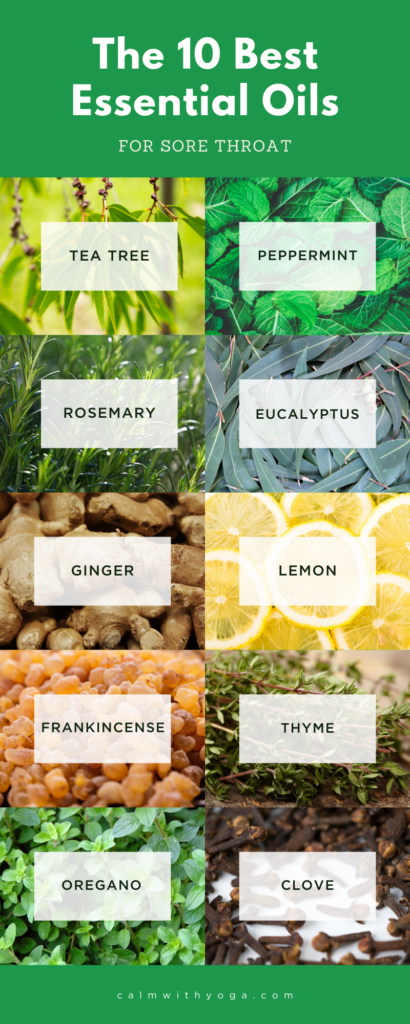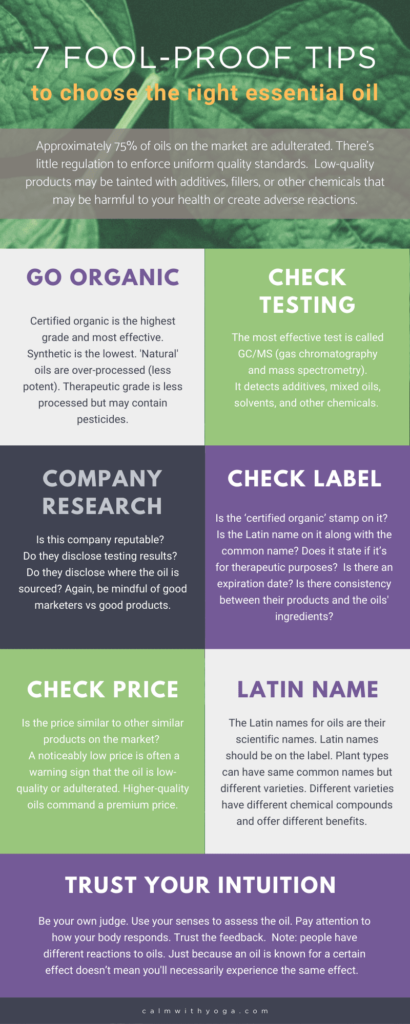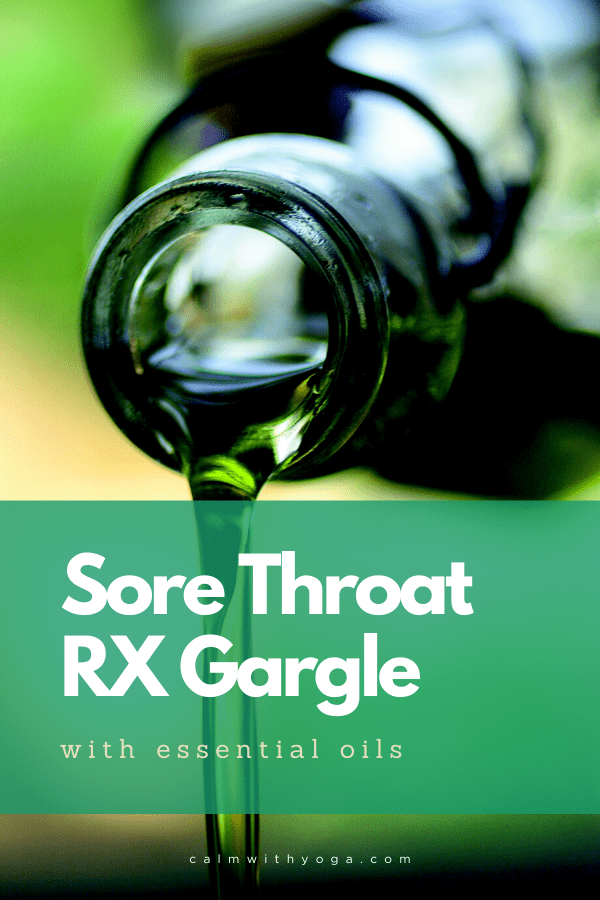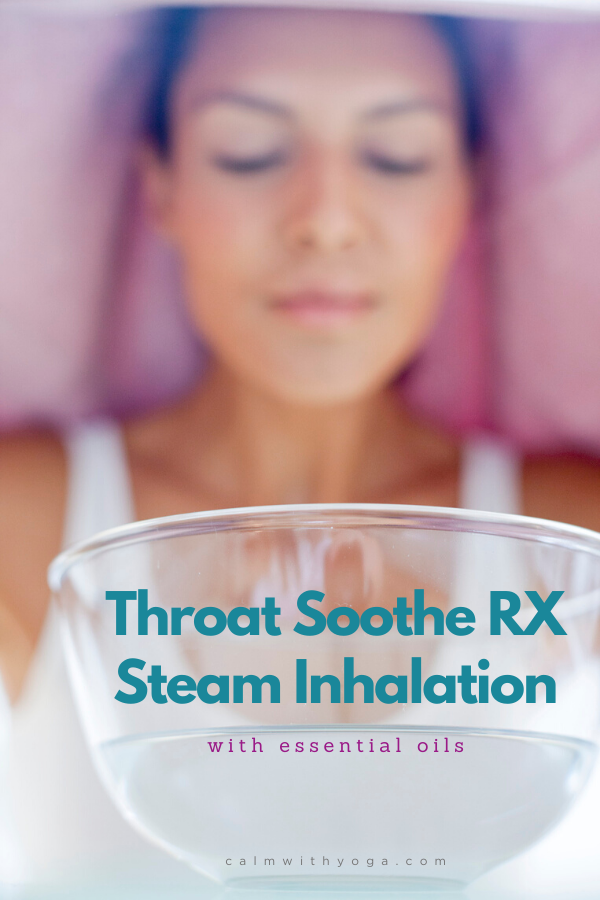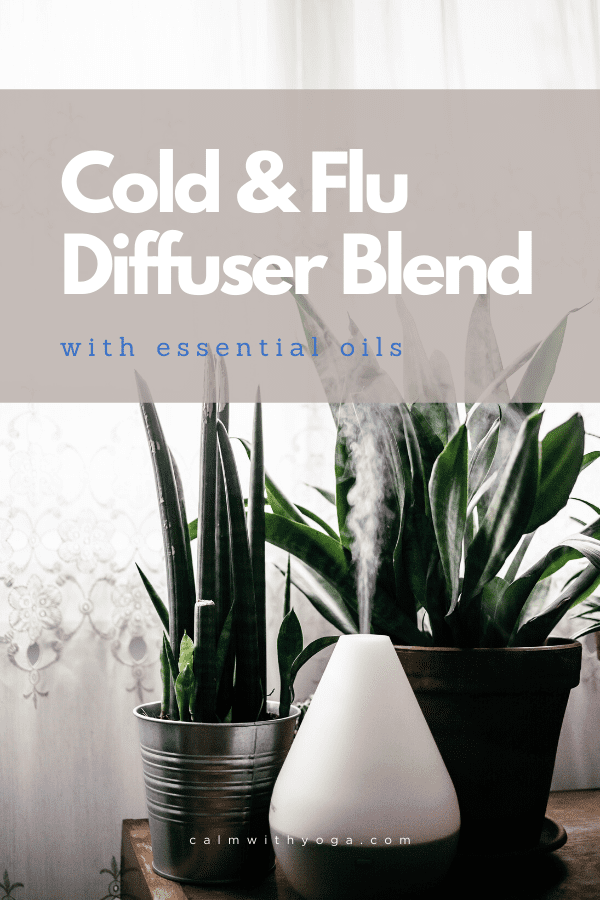Why People Are Turning To Essential Oils for Sore Throat Relief
If you value natural remedies for treating things like the common cold, strep throat, headaches, pharyngitis, or respiratory infections then essential oils should be one of the things in your at-home medicine cabinet right along with Vitamin C.
Essential oils (EOs) are plant-extracted highly concentrated aromatic compounds found in material such as tree bark, leaves, flowers, roots, resin, fruit, and nuts.
They’re considered a form of herbal medicine and holistic healing, and their therapeutic application is often referred to as aromatherapy.
Essential oils make great home remedies if you know how to use them safely.
How EOs Work To Soothe Sore Throat Pain
EOs offer multiple mental, emotional, and physical health benefits when used correctly and mindfully.
There are specific EOs that are particularly effective at treating throat infections and alleviating the pain and discomfort that comes along with it.
If you’re looking to use EOs medicinally for this purpose you want to look for oils that have the following healing properties:
- Immune system support to fight infections
- Anti-inflammatory properties
- Antibacterial properties to protect from and treat bacterial infections
- Antifungal properties to protect against fungal infections
- Antiviral properties to weaken and kill viral infections
- Antimicrobial properties stop the growth of microbes
- Antiseptic properties keep bacteria from growing
- Antitussive properties suppress the cough response that often creates throat soreness
- Pain relief because – sore throat – hello.
- Respiratory system support
The 10 Best Essential Oils for Sore Throat
Peppermint oil (Mentha piperita) 




- Pain reliever
- Antibacterial
- Anti-inflammatory
- Antiviral
- Antiseptic
- Cough suppressor
- Respiratory support
Menthol, the active compound in peppermint essential oil, is a sore throat soother and cough silencer which is why it’s included in so many cough drop formulas. (1)
Contraindications: children under 6 years old, high blood pressure, pregnant and breast-feeding women
Tea tree oil (Melaleuca alternifolia)




- Pain reliever
- Antibacterial
- Antifungal
- Anti-inflammatory
- Antiviral
- Cough suppressor
- Stimulates the immune system
- Respiratory support
Studies indicate tea tree essential oil has a protective effect against the influenza virus. (2)
It’s also used for respiratory tract infections and inflammatory respiratory conditions like sinusitis, rhinitis, laryngitis, & bronchitis.
It’s a strong antiseptic with high antimicrobial activity.
Since tea tree is so potent, always dilute it with a carrier oil like coconut oil for topical application.
Contraindications: Toxic if ingested, may cause irritation (perform a patch test before)
Oregano oil (Origanum vulgare)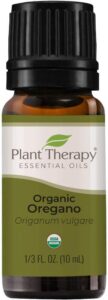




- Pain relief
- Antibacterial
- Antifungal
- Antiseptic
- Anti-inflammatory
- Antiviral
- Supports the immune system
Oregano essential oil contains carvacrol, an active compound that offers a strong protection from infections.
A study investigating the effects of an EO blend containing oregano on the upper respiratory tract found immediate and significant improvement in symptoms such as sore throat, cough, and hoarseness. (4)
Contraindications: Pregnant and breast-feeding women, if you’re taking multiple medications.
Clove oil (Eugenia caryophyllata, Syzygium aromaticum)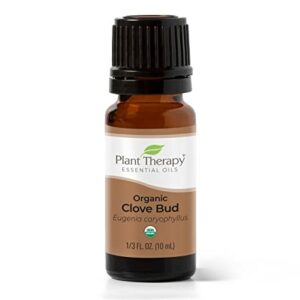




- Pain reliever
- Local anesthetic
- Antibacterial
- Antifungal
- Antiseptic
- Antiviral
- Antioxidant
Clove oil has also been shown to increase total leukocyte (white blood cell) count while also restoring antibody immunity in immunocompromised mice. (8)
In a study published on BMC Complementary & Alternative Medicine, an EO blend containing clove was found to protect against the influenza virus by reducing the number of infected cells by 90%. (9)
Ginger oil (Zingiber officinale)



- Pain reliever
- Antibacterial
- Anti-inflammatory
- Antioxidant
- Antiseptic
- Cough suppressor
- Stimulates the immune system
The anti-inflammatory agents in ginger oil can help calm throat inflammation and soreness.
Studies indicate that this oil offers immune support by activating antibody production. (6)
Contraindications: Might cause skin irritation if directly applied to the skin, use a carrier oil like fractionated coconut oil, and perform a patch test.
Lemon oil (Citrus limon)


- Antibacterial
- Antifungal
- Antioxidant
- Antiseptic
- Cough suppressor
- Immune support
Lemon essential oil, like other citrus oils, helps to activate lymphatic system flow and may be helpful for lymph node health.
The lymphatic system is an important part of the immune system because it carries white blood cells to targeted locations in the body.
Contraindications: Non-distilled lemon oil is phototoxic – avoid direct exposure to sunlight at least 12 hours after applying topically, may cause skin irritation (perform a patch test)
Eucalyptus oil (Eucalyptus globulus, Eucalyptus radiata)


- Pain reliever
- Antibacterial
- Antifungal
- Anti-inflammatory
- Antiseptic
- Antiviral (respiratory tract)
- Cough suppressor
- Stimulates the immune system
- Respiratory support
Eucalyptus essential oil has a cooling sensation that can soothe cough-associated soreness.
Its vapors open the sinus and nasal passages which can deepen breathing, especially in those experiencing sinusitis.
Contraindications: Those with high blood pressure, epilepsy, pregnant and breastfeeding women, children under 6 years old
Rosemary oil (Rosmarinus officinalis)


- Pain reliever
- Antibacterial
- Antifungal
- Antiseptic
- Antiviral
- Cough suppressor
- Stimulates the immune system
A study published in Alternative Therapies in Health and Medicine found that two active ingredients in rosemary essential oil, 1.8 cineole, and linalool, exhibited strong antimicrobial properties that guard against multiple harmful drug-resistant microbes. (5)
Contraindications: Pregnant women, epilepsy, high blood pressure, can be toxic if ingested.
Frankincense oil (Boswellia carterii)


- Pain reliever
- Antibacterial
- Anti-inflammatory
- Antiseptic
- Cough suppressor
- Stimulates the immune system
Frankincense’s vapors can open the nasal passages and soothe soreness.
This oil has been found to stimulate white blood cell activity by 90% (7)
Contraindications: none are known
Thyme oil (Thymus vulgaris var. linalool)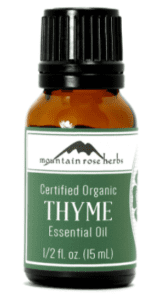

- Pain reliever
- Antibacterial
- Antifungal
- Anti-inflammatory
- Antiseptic
- Antiviral (respiratory tract)
- Cough suppressor
- Stimulates the immune system
Thyme essential oil has been used for thousands of years because of its potent medicinal properties.
When scientists investigated 120 strains of bacteria they found that thyme exhibited strong activity again all 120 clinical strains, including antibiotic-resistant strains. (3)
Contraindications: Epilepsy and pregnancy. May cause skin irritation – conduct a patch test.
The Pros & Cons of EOs for Sore Throat
The Pros:
- EOs are potent – a little goes a long way. Just a few drops of essential oil is all it takes to unleash the powerful active compounds.
- High-quality EOs should be 100% natural, undiluted, therapeutic, and organic. This means you have direct access to nature’s pharmacy and healing agents without the side effects often associated with prescription or over-the-counter medication.
- If you use EOs mindfully and consume them with care, you’ll likely experience little to no side effects. (Unlike most medication.)
- Unlike medication, you can blend multiple oils to maximize or enhance their healing and pain-relieving effects.
The Cons:
- EOs are potent – misuse or unnecessarily high concentrations can cause them to become irritants and may even make your sore throat worse.
- Unfortunately, there are many adulterated EO products out in the market that feature misleading claims and labels. It’s estimated that more than 75% of all EO on the market are either diluted or contaminated with synthetic material. (10)
- EOs aren’t cure-alls. (If you’re dealing with a persistent or worsening sore throat consult with your physician or medical provider prior to using them.)
- There are contraindications to be aware of for EO use. For example – tea tree oil is highly toxic if ingested. Be sure to inform yourself of each oil’s precautions before use.
- Most of the research done on EOs is mostly based on animal studies. More research is needed to explore EO healing and health benefits further, especially in humans.
How To Choose the Right High-Quality EO for Sore Throat Pain
As mentioned, since many oils on the market are diluted or adulterated it’s important to know what to look out for, especially if you’re using it for therapeutic and medicinal purposes.
Here are 7 tips to help you:
- Always choose certified organic and therapeutic grade
- Check quality assurance via testing
- Look into the company – are they reputable?
- Check the label.
- Don’t skimp or cheap out.
- Make sure the oil’s Latin name is on the label.
- Observe your body’s feedback and trust your intuition.
Note: Just because an EO is known to have a certain effect, it doesn’t mean each person will experience that same effect.
We’re all made up differently and have our own unique biochemistry that interacts with the oils.
This is why it’s very important to listen to your own body.
3 DIY Essential Oil Blends For Sore Throat Remedies
Sore Throat Rx Gargle
Gargling with EOs, salt, and warm water is an excellent way to get localized healing to your throat.
Be sure not to swallow or ingest the oils and fully spit them out.
Mixture:
- 1 glass of warm water
- 1 tsp sea salt
- 1 tsp Apple Cider Vinegar
- 1 tbsp organic Manuka honey
- 2 drops peppermint oil
- 2 drops oregano oil
- 2 drop lemon oil
- 1 drop ginger oil
Instructions:
Mix everything in the glass and gargle for 30-60 seconds then spit it out
For best results repeat 2-4 times daily until your sore throat is relieved.
Throat-Soothe Steam Inhalation
Inhaling EOs with steam is an effective way to not just soothe your sore throat but also open up the respiratory airways.
Mixture:
- 2 drops eucalyptus oil
- 2 drops tea tree oil
- 2 drops rosemary oil
- 1 drop clove oil
- 1 drop frankincense oil
Instructions:
Fill a large bowl or pot with boiling water, add the essential oils, and place a towel or blanket over you to contain the steam. Take deep, slow inhales.
Cold Rx Diffuser Blend
Diffusing your EOs helps to vaporize and disseminate millions of microparticles into the air around you in a safe and effective way.
Mixture:
- 3 drops Eucalyptus
- 3 drops Rosemary
- 3 drops Frankincense
- 2 drops Lemon
Instructions:
Add to 200 ml of water in your essential oil diffuser and then add the essential oils.
REFERENCES
:
(1) https://www.sciencedirect.com/topics/neuroscience/antitussives
(2) https://www.ncbi.nlm.nih.gov/pubmed/21095205
(3) https://www.researchgate.net/publication/221813564_Antibacterial_activity_of_thyme_and_lavender_essential_oils
(4) https://www.ncbi.nlm.nih.gov/pmc/articles/PMC2967840/
(5) https://www.ncbi.nlm.nih.gov/pmc/articles/PMC4514714/
(6) https://www.ncbi.nlm.nih.gov/pubmed/19589240
(7) https://www.ncbi.nlm.nih.gov/pubmed/12710734
(8) https://www.ncbi.nlm.nih.gov/pubmed/19589240
(9) https://www.ncbi.nlm.nih.gov/pubmed/17900043
(10) Essential Oils Revolution Online Summit, Interview with Robert Pappas, “Essential Oil Preparation”



